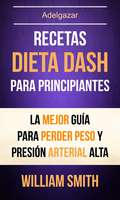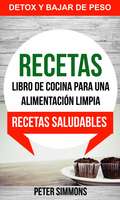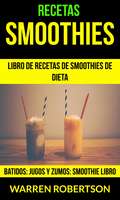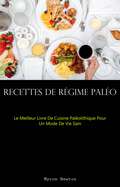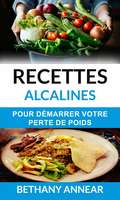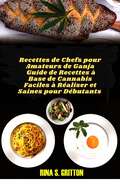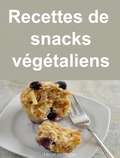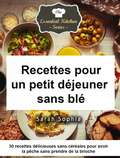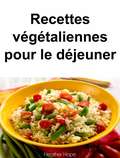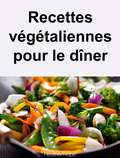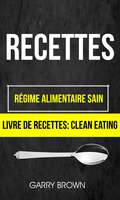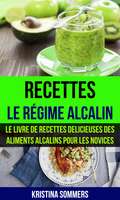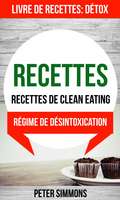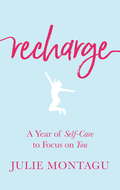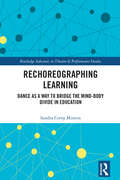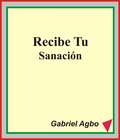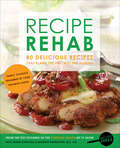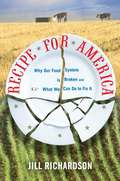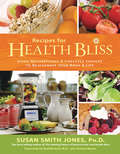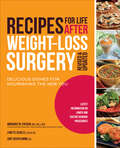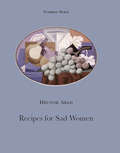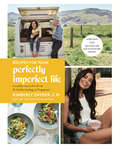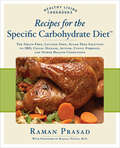- Table View
- List View
Recetas: La Mejor Guía Para Perder Peso Y Presión Arterial Alta (Adelgazar)
by William Smith Jimena González PiñolDescripción del Libro: La Dieta Dash Consiga sus metas de vivir más tiempo, más feliz, y más saludable. En los años recientes la Obesidad, Diabetes y la presión arterial alta han sido prominentes y son problemas que amenazan la vida de millones de personas cada día La dieta reducida en sal y enriquecida en nutrientes ayuda enormemente a reducir los riesgos cardiacos, diabetes, y cálculos renales, y muchos otros problemas provocados por una alimentación poco sana. Estos son los principales beneficios comprobados de la dieta Dash: •Reduce la presión arterial •Disminuye el colesterol •Pérdida de peso. Las recetas de la dieta Dash le enseñaran: •Recetas rápidas y deliciosas de 30 minutos. •Las mejores recetas de la dieta Dash •Recetas de la dieta Dash para cenar •Recetas de la dieta Dash para el desayuno •Recetas de la dieta Dash para el almuerzo •Recetas de la dieta Dash para bocadillos •Recetas de la dieta Dash para ensaladas •Recetas de la dieta Dash para aderezos, salsas y untables •¡Y mucho más! Para ayudarlo a mejorar hemos preparado una increíble colección de recetas que son divertidas y fáciles de preparar. ¡¡Sin necesidad de llamar al nutricionista!! Todo lo que necesita es un poco de creatividad. Con eso en mente déjeme llevarlo al mundo de la comida saludable, ¡¡hacia un futuro más saludable y delgado!! Es hora de actuar, y descargar éste libro para obtener los beneficios de la dieta Dash y comenzar a convertirse en la persona que usted quiere ser. La vida es corta para que le baste estar bien. ¡Comience a estar increíble hoy mismo!!
Recetas: Recetas Saludables (Detox y Bajar de Peso)
by Peter Simmons Alina V. Stiefel¡Increíbles recetas para una alimentación limpia que son realmente impresionantes! ¿Qué es la Alimentación Limpia? La Alimentación Limpia es básicamente comer alimentos reales, conocidos también como alimentos naturales. Los alimentos naturales son frescos, provienen de granjas y no están procesados. En el extremo opuesto se encuentran la comida chatarra y la comida rápida. Cuando se come limpio, se está alimentando el cuerpo de manera adecuada con los nutrientes que necesita para funcionar correctamente y hacerse más resistente a las enfermedades. Además, si usted lleva una alimentación limpia, lucirá más saludable y se sentirá con más energía. Alimentarse de manera limpia, como cualquier otro hábito, require de ciertos cambios en su estilo de vida. Estos cambios trabajan de manera conjunta para ayudarlo a que sea más fácil para usted llevar una alimentación limpia de manera regular. ¿Le gustaría mejorar su salud y perder peso? ¡Puede hacerlo con una dieta de alimentación limpia! La alimentación limpia mejora su salud, estimula su sistema inmunológico, le ayuda a pensar mejor, renueva la piel y el cabello y ayuda en la salud digestiva. Todo lo que el consumo de alimentos naturales requiere son unos pocos cambios nutricionales sencillos. Este tipo de dieta es simple, se puede sostener para resultados a largo plazo y genera satisfacción personal. Es hora de un cambio, ¡hoy es el momento para sentirse mejor! Teniendo en cuenta la cantidad de alimentos procesados que se encuentran hoy en día en el mercado, no es de extrañar por qué es tan difícil comer sano. Sin embargo, con recetas de alimentación limpia, usted tendrá la alternativa que su cuerpo anhela. Una vez que comience, sentirá cómo los alimentos naturales marcan la diferencia en su vida. Algunos de los profundos beneficios que se garantiza que usted experimente: &#
Recetas: Smoothie Libro)
by Warren Robertson Norma FernandezEl uso de smoothies para ayudar a perder peso es más que una moda, ya que realmente puede ayudar cuando se hace bien. Hacerlo bien es exactamente lo que este libro te enseñará. Cada ingrediente se desglosa para que sepas exactamente por qué se puede añadir al smoothie, y poco después de leer este libro te resultará fácil experimentar con tus propios smoothies también. Estas treinta y siete recetas de smoothies son una maravillosa manera de empezar a trabajar en un régimen de pérdida de peso. Este libro también te enseña cómo equilibrar tus smoothies para que sepas exactamente lo que estás metiendo en tu cuerpo y por qué. Con todo balanceado, podrás lograr poner tu cuerpo en equilibrio también. Un cuerpo en equilibrio significa que la pérdida de peso es un poco más fácil, y este libro es sólo el comienzo. Estas recetas están diseñadas para ayudar a todos los gustos, desde el amante del café hasta los amantes del chocolate y todo lo demás, cada receta es única y agradable. Este libro te enseñará más de veinte diferentes recetas de smoothies. Este libro también analiza los ingredientes útiles de cada smoothie para que sepas exactamente por qué se incluyen en la receta. También encontrarás las instrucciones para estas recetas de smoothies, asegurándote de que cada smoothie salga perfecto. Este libro también te enseña cómo equilibrar tus smoothies para que sepas exactamente lo que estás metiendo en tu cuerpo y por qué. Con todo balanceado, podrás lograr poner tu cuerpo en equilibrio también. Un cuerpo en equilibrio significa que la pérdida de peso es un poco más fácil, y este libro es sólo el comienzo. Estas recetas están diseñadas para ayudar a todos los gustos, desde el amante del café hasta los amantes del chocolate y todo lo demás, cada receta es única y agradable. Como entrenador de bienestar con una pasión por el ejercicio y la nutrición, me encantan los smoothies natural
Recettes De Régime Paléo : Le Meilleur Livre De Cuisine Paléolithique Pour Un Mode De Vie Sain
by Myron NewtonCe livre présente des étapes et stratégies ayant fait leurs preuves et visant à simplifier la vie de tout débutant. Vous pourrez ainsi profiter des bienfaits du mode de vie paléo tout en vous sentant rassasiés et en ravissant vos papilles. En fait, le régime paléo vous permet un retour aux sources en renouant avec une alimentation saine et de qualité. Vous bénéficierez du régime paléo de mille et une façons en réduisant les risques pour votre santé, en décuplant votre endurance et votre énergie. Et, surtout, certains adeptes du régime paléo pourront perdre du poids de manière contrôlée et personnalisée. Entreprendre un régime est plus facile à dire qu’à faire. Il y a de nombreux facteurs à prendre en compte et certains sont particulièrement difficiles. Voilà, je suis honnête avec vous. Au fil de ces pages, vous découvrirez en quoi consiste véritablement le régime paléo. Vous pourrez ainsi en évaluer les mérites et décider si un tel mode de vie est fait pour vous ou non. Téléchargez ce livre dès aujourd’hui !
Recettes alcalines pour démarrer votre perte de poids
by Clothilde Courtois Bethany AnnearCe livre ne fournit pas seulement des informations détaillées sur le Régime alimentaire alcalin. Il contient également la multitude de nouvelles recettes dont vous aurez besoin pour le suivre. Êtes-vous prêt à perdre du poids et à vous refaire une santé ? Pour suivre le Régime alcalin, il s’agira de vous concentrer sur vos habitudes alimentaires quotidiennes. Le Régime alcalin présente beaucoup d’avantages, et le Livre de Cuisine Alcaline vous aidera à contrôler le niveau de pH de votre corps. Vous trouverez dans ce livre de délicieuses recettes. Celles-ci viennent avec des instructions complètes rendant le travail facile. Ce livre contient 25 recettes délicieuses, accompagnées d’images et instructions faciles à suivre. Vous pourrez essayer n’importe quelle recette facilement et obtenir les résultats escomptés. Vous pourrez perdre du poids, réduire le risque de contracter le cancer et de nombreux autres problèmes de santé. Ce livre peut faire office de guide rapide, alors téléchargez-le et suivez ses recettes. Il conviendra d’utiliser des ingrédients frais pour en tirer un maximum d’avantages. Chaque recette est conçue avec soin pour améliorer votre santé et protéger votre corps des éléments toxiques. Ce livre contient : Des recettes alcalines pour le petit déjeuner Des recettes alcalines pour le déjeuner Des recettes alcalines pour le dîner Des collations alcalines pour le goûter Des recettes alcalines de desserts Vous découvrirez : Qu’est-ce que le régime alcalin ? Qu’est-ce que le pH ? Les avantages d’un régime alcalin Exemples d’aliments acides, alcalins et neutres Les aliments alcalins à manger et les aliments à éviter Installer des applications et sauvegarder sur une carte SD Recettes pour le petit déjeuner Recettes pour le déjeuner Recettes pour le dîner Et bien plus ! Téléchargez ce livre pour en savoir plus sur la liste des aliments alcalins, et obtenir des recettes saines pour tous. Vous p
Recettes de Chefs pour Amateurs de Ganja
by Rina S. GrittonGuide de Recettes à Base de Cannabis Faciles à Réaliser et Saines pour Débutants
Recettes de snacks végétaliens
by Heather Hope Isabelle VerpeauxRecettes de snacks végétaliens Collection Essential Kitchen, Recueil 36 De temps à autre, nous redevenons de jeunes enfants et apprenons à aimer et anticiper tout ce qui est associé à un « snack ». Ces savoureuses bouchées qui ravissent nos papilles comme nulles autres sont gravées dans nos palais. La collection Essential Kitchen arrive à la rescousse avec le recueil Recettes de snacks végétaliens, 30 recettes destinées à satisfaire et enchanter votre famille, vos invités ou simplement vous-même avec une petite friandise de fin de soirée. Vous ne serez plus jamais gêné(e) d'apporter un plateau de snacks végétaliens pour une fête, où vous éblouirez vos amis et convaincrez les incrédules. Ne laissez pas votre mode de vie sur le pas de la porte et ayez confiance dans vos choix. Apprenez à maîtriser la cuisine végétalienne Par où commencer ? Les premières pages de ce recueil unique de recettes répondent aisément à cette question. Utilisez-le comme une arme secrète, en vous entraînant et en affinant vos techniques avec chaque nouvelle recette. Très bientôt, vous transformerez les plats « bof » en créations qui déclencheront des « waouh ». Amusez-vous, acceptez le défi d'essayer des nouveautés et lancez-vous - vos papilles vous remercieront plus tard. Ne passez pas à côté des saveurs Nous n'insinuons pas que vous devez modifier intégralement vos habitudes alimentaires mais nous vous encourageons à essayer des nouveautés - de celles qui mettent si délicieusement l'eau à la bouche que vous serez ravi(e) d'avoir essayé. Apprenez ce que des milliers d'autres ont déjà découvert : le mode de vie végétalien peut être gratifiant, ludique et délicieux. Si vous êtes déjà adepte du végétalisme, ce recueil enrichira votre choix de recettes. Si vous caressez l'idée d'essayer, saisissez ce recueil comme une introduction merveilleusement savoureuse à la cu
Recettes pour un petit déjeuner sans blé: 30 recettes délicieuses sans céréales pour avoir la pêche sans prendre de la brioche
by Sarah SophiaDepuis des années, les chercheurs ne cessent de nous rappeler l'importance d'un petit déjeuner équilibré et nutritif. Il est essentiel d'adopter une alimentation saine pour vivre plus longtemps tout en restant en bonne santé. Il n'est jamais trop tard pour commencer ! Ce livre vous donnera l'occasion d'essayer des recettes pour le petit déjeuner et il vous fera certainement changer vos habitudes alimentaires. Mais, au bout du compte, vous gagnerez en vitalité et vous finirez par vous sentir mieux physiquement et intellectuellement.
Recettes végétaliennes pour le déjeuner
by Heather Hope Isabelle VerpeauxRecettes végétaliennes pour le déjeuner Collection Essential Kitchen, Recueil 29 Préparez et cuisinez de délicieux déjeuners, source d'inspiration de votre mode de vie, aux petits soins pour votre système digestif et séduisant vos amis pour rejoindre la révolution. Le déjeuner est le repas le plus difficile de la journée. Les contraintes de temps, de lieu et autres limitations peuvent entraver votre style. C'est à ce stade que la collection Essential Kitchen arrive à la rescousse avec Recettes végétaliennes pour le déjeuner, une fascinante collection de 30 recettes. Elles sont destinées à satisfaire les appétits les plus voraces en milieu de journée et à séduire les palais les plus exigeants. Vous ne serez plus jamais gêné(e) d'apporter un déjeuner végétalien au travail, où vous éblouirez vos amis et convaincrez les incrédules. Ne laissez pas votre mode de vie sur le pas de la porte et ayez confiance dans vos choix. Apprenez à maîtriser la cuisine végétalienne Par où commencer ? Les premières pages de ce recueil unique de recettes répondent aisément à cette question. Utilisez-le comme une arme secrète, en vous entraînant et en affinant vos techniques avec chaque nouvelle recette. Très bientôt, vous transformerez les plats « bof » en créations qui déclencheront des « waouh ». Amusez-vous, acceptez le défi d'essayer des nouveautés et lancez-vous - vos papilles vous remercieront plus tard. Ne passez pas à côté des saveurs Nous n'insinuons pas que vous devez modifier intégralement vos habitudes culinaires mais nous vous encourageons à essayer des nouveautés - de celles qui mettent si délicieusement l'eau à la bouche que vous serez ravi(e) d'avoir essayé. Apprenez ce que des milliers d'autres ont déjà découvert : le mode de vie végétalien peut être gratifiant, ludique et délicieux. Si vous êtes déjà adepte du végétalisme, ce recueil enrichi
Recettes végétaliennes pour le dîner
by Heather Hope Isabelle VerpeauxRecettes végétaliennes pour le dîner Collection Essential Kitchen, Recueil 31 Préparez et cuisinez de délicieux dîners, source d'inspiration de votre mode de vie, aux petits soins pour votre système digestif et séduisant vos amis pour rejoindre la révolution. La meilleure façon de terminer une journée chargée consiste à partager un succulent dîner avec des amis ou en famille. La nouveauté...quelque chose de différent, peut générer de l'enthousiasme autour du repas et le transformer en événement social. C'est à ce stade que la collection Essential Kitchen arrive à la rescousse avec Recettes végétaliennes pour le dîner, une étonnante collection de 30 recettes. Elles sont destinées à satisfaire les convives les plus tatillons et à séduire les palais les plus exigeants. Vous ne serez plus jamais gêné(e) d'apporter un plat végétalien pour un repas à la fortune du pot, où vous éblouirez vos amis et convaincrez les incrédules. Ne laissez pas votre mode de vie sur le pas de la porte et ayez confiance dans vos choix. Apprenez à maîtriser la cuisine végétalienne Par où commencer ? Les premières pages de ce recueil unique de recettes répondent aisément à cette question. Utilisez-le comme une arme secrète, en vous entraînant et en affinant vos techniques avec chaque nouvelle recette. Très bientôt, vous transformerez les plats « bof » en créations qui déclencheront des « waouh ». Amusez-vous, acceptez le défi d'essayer des nouveautés et lancez-vous - vos papilles vous remercieront plus tard. Ne passez pas à côté des saveurs Nous n'insinuons pas que vous devez modifier intégralement vos habitudes culinaires mais nous vous encourageons à essayer des nouveautés - de celles qui mettent si délicieusement l'eau à la bouche que vous serez ravi(e) d'avoir essayé. Apprenez ce que des milliers d'autres ont déjà découvert : le mode de vie végétalien peut être
Recettes: Clean Eating)
by Garry Brown Violaine LenthéricClean eating, livre de recettes Le « Clean Eating », c’est une méthode simple et efficace pour améliorer votre santé. Alors, venez consulter sans plus attendre les alléchantes recettes que nous vous présentons ci-après.
Recettes: Le livre de Recettes delicieuses des aliments Alcalins pour les novices
by Kristina Sommers Katherine IvisonVous êtes au point de découvrir comment faire des plats incroyablement simples et savoureux qui vont vous aider à perdre du poids rapidement et facilement, sans avoir à comprendre le fonctionnement d'un régime ou d'une formule alimentaire compliqué. Ce livre se concentre sur des aliments réels for des personnes réels avec des résultats réellement prouvés. Je suis confidente que ce livre va vous aider à perdre le poids dont vous pensiez être impossible d’en perdre et va vous aider à vous sentir mieux et plus actif. Cuisinez mois, sentez-vous incroyables! Balancer le pH de votre corps et débloquer une santé optimale avec ces recettes délicieuses. La nourriture Alcaline offre des bénéfices d'esprit inhabituels et à la santé du corps. •Perte de poids et bruler les calories •Pensées plus claires •Tranquillité d'esprit et moins irritable •Balancer le système immunitaire et moins d'inflammation •Meilleur concentration et motivation •Peau, ongles et cheveux plus sains •Plus de vigueur •Meilleur mémoire •Se sentir et paraitre plus jeune Pourquoi se nourrir selon le pH ? Le régime alcalin aide à créer plus d'environ alcalin dans notre corps, ce qui aide à combattre des maladies liées à l'alimentation. The livre de recettes Alcalin essentiel rends la cuisine équilibrée, avec des plats nourrissants et hyper simples. Le REGIME ALCALIN est une des meilleures lignes de défense contre un grand nombre de conditions de santé d'aujourd'hui. Voilà un aperçu de ce que vous allez apprendre : •Recettes faciles pour le Petit-Déjeuner
Recettes: Régime de désintoxication)
by Peter Simmons Emma BograndDétox Loin d’un quelconque effet de mode, la détox s’impose comme un ART de VIVRE alliant alimentation et hygiène de vie, comme une bulle de bien-être dans votre quotidien. Grâce à la détox, retrouvez énergie, vitalité, légèreté et tellement plus encore. Dans ce livre, vous découvrirez de délicieuses recettes saines fondées sur le Clean Eating qui vous combleront. Découvrez les innombrables bénéfices du Clean Eating qui vous aideront à améliorer votre santé. Dans le monde actuel, il est important de rester en bonne santé pour demeurer performant. Le Clean Eating vous fournit les vitamines nécessaires tout en nettoyant votre organisme de tous les déchets que vous avez accumulés au cours des ans. À essayer sans hésitation !!
Recharge: A Year of Self-Care to Focus on You
by Julie MontaguA month-by-month self-care bible by world-renowned wellness guru Julie Montagu.'The ultimate self-care bible for women who want to find their balance in life' Mel Wells'Wonderful and insightful . . .proves that when you choose YOU every single day, not only will have you have more energy for yourself, but you'll have more energy to give back to everyone else.' Kris Carr'This book is bursting with positivity, happiness & a whole wealth of knowledge' Chessie KingRecently named one of the top ten holistic health icons in the world, Julie Montagu knows a thing or two about health and happiness. In Recharge, Montagu shares an abundance of guidance, tips and advice designed to help you keep self-care at the forefront of your mind and support you on your journey to a well-rounded sense of wellness.Recharge is your month-by-month self-care bible to help replenish your mind, body and soul. Each month of the year covers a specific area of self-care including mindful eating, managing stress, digital detox, rebuilding self-esteem, finding your passions and more.
Recharge: A Year of Self-Care to Focus on You
by Julie MontaguA month-by-month self-care bible by world-renowned wellness guru Julie Montagu.'The ultimate self-care bible for women who want to find their balance in life' Mel Wells'Wonderful and insightful . . .proves that when you choose YOU every single day, not only will have you have more energy for yourself, but you'll have more energy to give back to everyone else.' Kris Carr'This book is bursting with positivity, happiness & a whole wealth of knowledge' Chessie KingRecently named one of the top ten holistic health icons in the world, Julie Montagu knows a thing or two about health and happiness. In Recharge, Montagu shares an abundance of guidance, tips and advice designed to help you keep self-care at the forefront of your mind and support you on your journey to a well-rounded sense of wellness.Recharge is your month-by-month self-care bible to help replenish your mind, body and soul. Each month of the year covers a specific area of self-care including mindful eating, managing stress, digital detox, rebuilding self-esteem, finding your passions and more.
Rechoreographing Learning: Dance As a Way to Bridge the Mind-Body Divide in Education (Routledge Advances in Theatre & Performance Studies)
by Sandra Cerny MintonThis book addresses the mind-body dichotomy in movement and dance. This book includes a description of the often-forgotten kinesthetic sense, body awareness, somatic practices, body-based way of thinking, mental imagery, nonverbal communication, human empathy, and symbol systems, what occurs in the brain during learning, and why and how movement and dance should be part of school curricula. This exploration arguers that becoming more aware of bodily sensations serves as a basis for knowing, communicating, learning, and teaching through movement and dance. This book will be of great interest to scholars and students interested in teaching methodology and for courses in physical education, dance, and education.
Recibe Tu Sanación
by Gabriel AgboEste libro es acerca de cómo recibir sanación divina. ¿Puede Dios curar todavía? ¡Sí! Nuestro Dios es el mismo ayer, hoy y siempre. Espera tu sanación mientras lees este libro. Aquí, leerás algunos testimonios increíbles que instantáneamente aumentarán tu fe en Dios y en Su ilimitada capacidad y deseo de intervenir hasta en las peores situaciones. Por ejemplo, Dios todavía cura enfermedades incurables y terminales. Él todavía resucita a los muertos. ¿Has leído acerca de un hombre que fue resucitado de la muerte luego de permanecer dos días en la morgue? Ahora bien, si Dios puede hacer eso, ¿por qué piensas que no se puede hacer nada con respecto a tu situación? Hay muchos otros testimonios increíbles aquí. Hay diez capítulos poderosos y luminosos en este libro: Todo es Posible, La Sanación es tu Derecho, el Origen de las Enfermedades, La Palabra de Dios, El Nombre de Jesús, El Espíritu Santo, El Poder de la Fe, Còmo conservar tu Sanación. También aprenderás sobre los roles de la oración, la unción con aceite, la imposición de manos, la compasión (amor), la obediencia, los ángeles, la alabanza y la adoración, etc, en nuestro afán de que recibas y conserves tu sanación. Este libro está diseñado para que recibas tu sanación mientras lo vas leyendo, y es muy práctico.
Recipe Rehab: 80 Delicious Recipes That Slash the Fat, Not the Flavor
by JoAnn Cianciulli Everyday HealthThe companion book to the popular TV show, Recipe Rehab offers delicious and healthy makeovers of your favorite foods.First it was a hit YouTube show from Everyday Health; then it was a popular broadcast TV show; and now, Recipe Rehab is finally a cookbook!In Recipe Rehab, you’ll discover 80 rehabbed classics from TV chefs such as Spike Mendelsohn, Candice Kumai, and Aida Mollenkamp.Indulge in all of the foods you love to eat—from Mexican food such as tacos and nachos, to Chinese take-out favorites, satisfying burgers, and carb-lovers pasta picks. These over-the-top dishes have all been transformed into meals that are healthy for the whole family, and simple for the busy home cook.In Recipe Rehab you’ll find recipes for breakfast, lunch, and dinner, and even appetizers, snacks, and desserts—plus tips for rehabbing your own family recipes.With nutritious kid-friendly dishes such as Chicken Drumsticks and Fish and Chips; party-worthy snacks that range from Prosciutto-Wrapped Figs to Creamy Kale and Artichoke Dip; and decadent desserts, like chocolate cupcakes and Pumpkin Bars with Cream Cheese Frosting; Recipe Rehab is sure to become a staple in your kitchen.
Recipe for America
by Jill Richardson"Jill Richardson is a fresh voice in the movement to create a healthier and sustainable food system. This book will be part of the burgeoning food social movement, as it provides a guide to the most important issues and how to work on them."--Marion Nestle"Jill's work at Daily Kos represents the best of the people-powered movement. It's a pleasure to see her work reach a new plateau and come to the attention of a wider audience."--Markos MoulitsasAmerica's food system is dominated by agribusiness and corporate farms, whose destructive practices pollute the environment, are cruel to animals, and offer us unhealthy food choices. Despite this dire situation, most people have little idea how to eat differently, or healthier.In Recipe for America, food activist Jill Richardson shows how sustainable agriculture--where local farms raise food that is healthy for consumers and animals and does not damage the environment--offers the only solution to America's food crisis. In addition to highlighting the harmful conditions at factory farms, this timely and necessary book details the rising grassroots food movement, which is creating an agricultural system that allows people to eat sustainably, locally, and seasonally.A call to action for those who are concerned about what they eat and the health of the planet, Recipe for America shows how sustainable eating nourishes our bodies, our economy, and our environment, and how it is the best hope for the future of food in America.Jill Richardson blogs about food issues at Daily Kos and at her own blog, La Vida Locavore (http://www.lavidalocavore.org). She is also a member of the advisory board of the Organic Consumers Association.
Recipes for Health Bliss: Using Naturefoods And Lifestyle Choices To Rejuvenate Your Body And Life
by Susan Smith JonesDo you want to learn how to make and enjoy the finest and most delicious healthful recipes imaginable? Would you like to lose weight and gain fitness and vitality? If so, then this extraordinary recipe book is for you! It will introduce you to the surefire secrets of how to make irresistible, nutrient?rich meals; trim excess pounds; and promote a life of vitality, happiness, and renewed self?esteem. In this book, renowned health expert Susan Smith Jones shows you how to make the appropriate food and lifestyle choices to reduce your risks of premature aging, arthritis, diabetes, heart disease, obesity, mental dysfunction, and some common forms of cancer. You’ll enjoy fast, easy?to?prepare meals and snacks that are as delicious as they are nutritious, all made with familiar, easy?to?find ingredients. In this book, you’ll learn to make and enjoy over 250 scrumptious, natural?food recipes, lose weight the easy, natural way, know which SuperFoods heal your body, look and feel ten years younger in 30 days, discover the world’s seven best stress?busters, and rejuvenate your self?esteem and confidence.
Recipes for Life After Weight-Loss Surgery: Delicious Dishes for Nourishing the New You
by Margaret M. Furtado Lynette Schultz Joseph EwingWeight loss surgery is only the first step to maintaining a healthy weight. Post-surgery is when it is most important to maintain proper eating habits with the right balance of nutrients. Recipes for Life After Weight-Loss Surgery, Revised and Updated provides you with a variety of tasty meals that are tailored for each stage of your post-operative eating plan. Included are meal plans, pantry lists, and 200 recipes that are delicious and specifically tailored to weight-loss surgery requirements:— Zucchini Frittata with Capers and Olives— Lavender-Blueberry Muffins— Sesame-Glazed Salmon— Fall Harvest Pumpkin SoupThis revised and expanded edition includes 50 new recipes with nutritional analysis, meal plans for each post-op stage, and the latest information on weight loss surgery and procedures.
Recipes for Sad Women
by Anne Mclean Hector AbadNo one knows the recipe for happiness - and yet Héctor Abad has given us a whole volume. His recipes, at times bizarre, at times wise, can cure almost anything - although the ingredients are not always easy to come by. "Cauliflower in the mist" is protection against melancholy, seasoned with salty tears; and the right preparation of lobster and cutlet can have extraordinary effects on the human mind. With subtle wit and irony, Abad gives practical advice on how to eschew sadness, attract joy and retain delight.
Recipes for Your Heart's Delight: The Stanford Guide to Healthy Cooking
by The Stanford Heart Disease Prevention ProgramAll the recipes are low in salt, fat and sugar compared to regular recipes of their type, but are still delicious.
Recipes for Your Perfectly Imperfect Life: Everyday Ways to Live and Eat for Health, Healing, and Happiness
by Kimberly SnyderThe New York Times bestselling author of the Beauty Detox series, nutritionist, and personal development expert Kimberly Snyder offers us a powerful new guide to help us feel good, eat well, dispel insecurities, and increase our love of life.Feeling good is not about having a picture-perfect life with a flawless body, job, and family. We can have those things and still feel deeply unhappy. Joy and true confidence come by finding a level of inner peace in our messy, perfectly imperfect lives.In this beautiful, inspirational, and highly anticipated new book, Kimberly Snyder shares not only her amazing new food recipes but also practical tips for living a happy and fulfilling life. As Snyder teaches, the key is to live beyond labels, heal body shame, and move past self-judgment. By embracing life's ups and downs and learning to tune into our intuition, we can ultimately claim our right to feel good, just as we are. With dozens of life lessons and more than 100 plant-based recipes for smoothies, soups, snacks, and entrées, Recipes for Your Perfectly Imperfect Life invites us to find inner peace and acceptance, and teaches us how a healthier mind and body can give us strength to thrive in all parts of our lives.
Recipes for the Specific Carbohydrate Diet: The Grain-Free, Lactose-Free, Sugar-Free Solution to IBD, Celiac Disease, Autism, Cystic Fibrosis, and Other Health Conditions (Healthy Living Cookbooks)
by Raman Prasad“This clever book is not just a great supplement to the Specific Carbohydrate Diet . . . but will also ensure the whole family enjoys a healthy . . . yummy diet.” —Mik Aidt, Founder and co-webmaster, www.scdiet.orgThe Specific Carbohydrate Diet (SCD) is a strict grain-free, lactose-free, and sucrose-free dietary regimen intended for those suffering from Crohn’s disease and ulcerative colitis (both forms of IBD), celiac disease, IBS, cystic fibrosis, and autism. For those suffering from gastrointestinal illnesses, this book offers a method for easing symptoms and pain, and ultimately regaining health. Recipes for the Specific Carbohydrate Diet(TM) includes a diverse and delicious collection of 150 SCD-friendly recipes and more than eighty dairy-free recipes. The easy-to-make and culturally diverse recipes featured in the book include breakfast dishes, appetizers, main dishes, and desserts, such as Hazelnut-Vanilla Pancakes, Olive Sandwich Bread, Chicken Satay, Roasted Bass with Parsley Butter, Thin Crust Pizza, Gretel’s Gingerbread Cookies, and Mango Ice Cream. Full-color photos will inspire you to get cooking again. In addition, personal anecdotes accompany each section of this book. Find out more at www.scdrecipe.com/cookbook/.“Raman Prasad shares his personal experience in this comprehensive cookbook. It is a wonderful contribution and tribute to Elaine Gottschall and it will be an invaluable resource for those suffering with gastrointestinal issues. He provides a comprehensive overview of the science behind the diet, menus, holiday traditions, and gourmet recipes. This book will give families the confidence they need to heal.” —Pam Ferro, R.N., Founder of The Gottschall Autism Center
